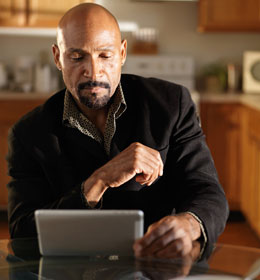
I’m one of more than 17 million Americans who now have access to the visit notes my doctors write after my appointments with them. Here’s what I want my doctors to know: I’m a good listener – really, I am – but when I read my visit notes, I realize that I miss a lot during my appointments. So, thank you for giving me the opportunity to review the notes at home, when it’s convenient for me. It makes a difference, and I appreciate it.
During three years as a member of the OpenNotes research team, I’ve read the literature and talked with doctors and patients about the benefits of note sharing, but it’s a different learning experience when it’s your notes and your health. It’s been eye opening and has helped me think about what’s most important to me in exchanging information with my healthcare team.
I’ve recently been involved in research examining this idea more closely.
When experts talk about the power of health information technology, we hear a lot about efforts to engage patients and make care more patient- and family-centered, but we’ve heard very little about what matters to the patients themselves. Perhaps this is because information sharing has been largely one-way, from healthcare teams to patients, without giving patients the opportunity to add to the discussion. That’s the gap our research tried to fill.
Our team offered patients a tool to provide feedback about what they valued about accessing their notes. The results of the research were published recently in the Journal of Medical Internet Research.
Here’s what patients want their doctors to know.
Patients overwhelmingly appreciate the ability to confirm and remember next steps. They like quicker access to information, especially results. They want their doctors to know that reading the notes helps them gain confidence in the doctor/patient relationship and helps them feel heard and understood. And they value the opportunity to share information with care partners.
One patient wrote, “I sometimes have white coat syndrome, where I am a little nervous in the doctor’s office and then cannot remember all that was said. Reading the notes after my visits confirms what I have heard.”
And this patient’s comment sounds like something my mom, who helps care for my grandfather, would say, “We are grateful to receive ‘notes’ to be able to review the visit and procedures (if any) performed. Especially helpful for older patients who may have hearing and/or some cognitive (or) memory loss.”
Patients also like being able to confirm the accuracy of the note and catch potential errors, a critical type of engagement that can help make care safer.
I was particularly struck to learn that many patients value the simple act of being given the opportunity to provide feedback. This may turn out to be the most important finding of all.
Offering transparent communication and asking patients what they value in the exchange sends a powerful message of inclusivity. The culture change – for doctors and for patients – that comes with OpenNotes provides a solid foundation, not just for engagement, but for all kinds of health transformation.
I’m wrapping up my research at OpenNotes and have started medical school at Wayne State in Detroit. I’m glad I was given the opportunity to be part of this research effort. I know the experience will serve me well as I train to be a doctor, and down the road, I hope that my patients will have the same experience or even better experience with their notes.
In the meantime, I encourage all patients to ask for their notes. There’s some helpful information about how to get started at opennotes.org/join. I encourage doctors, nurses, therapists, and others to share their visit notes and to ask their patients what they value most about having access to them. For more information, please contact us at myopennotes@bidmc.harvard.edu.
Congratulations to the 2017 Sherman Award winners, University of Rochester Medical Center and Holland Bloorview Kids Rehabilitation Hospitals. We hope to see you on the OpenNotes map soon. Let us know if we can help!





1 Comment
Great work. Would love to discuss. Working as Improvement Science Fellow on patient created records with the Health Foundation in the U.K.
Would be grateful for opportunity to discuss.
Yours
Chris